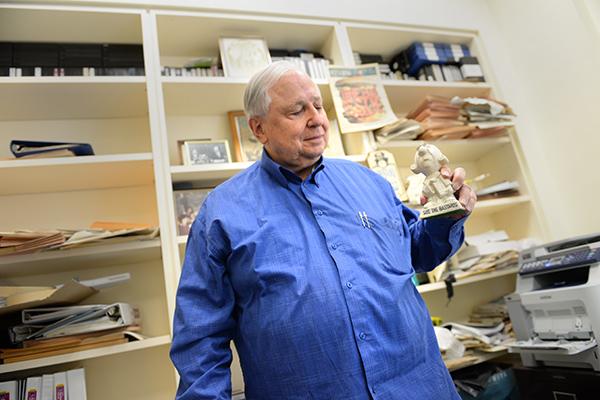
Before Richard Nixon resigned from office forty years ago this month, a GW law professor urged a federal judge to assign a special prosecutor to the case.
John Banzhaf was closely following developments in the Watergate scandal when he decided to petition for a new prosecutor – one who didn’t report to the president – to investigate the case instead of a Department of Justice official. That landmark petition paved the way for Nixon’s resignation in 1974.
A trained engineer turned legal activist, Banzhaf’s work has centered on identifying situations he finds unjust and offering legal solutions. Some of his notable successes include gaining women’s access to D.C.’s Cosmo’s Club, a historically all-male social club, and requiring broadcasters to show an equal number of anti- and pro-tobacco commercial advertisements on television.
“I’m always on the alert for situations that seem important and significant and where I might be able to contribute or have some impact with my legal knowledge,” Banzhaf said.
As news began to unravel that the Watergate break-in could be connected to the White House, Banzhaf said he was alarmed by reports that Justice Department officials had told members of the Grand Jury that they could not indict a sitting president. The news prompted him to file a motion for the government to appoint a special prosecutor to investigate the president’s role in the break-in.
The petition was denied, but Banzhaf said the publicity helped show lawmakers that such a step was an option.
“I played a small role, but probably a significant role, in getting Nixon out of the office and setting up this new statute, which was then used in quite a number of subsequent cases,” Banzhaf said.
Then 32 years old, Banzhaf said his motion was likely denied because the judge, John Sirica, wanted to uncover what happened himself. Banzhaf remembers that Sirica threw him out of the courtroom.
“I resented his appearance,” Sirica, who dropped out of GW Law School after one month at age 17, wrote in his memoir “To Set the Record Straight.” “I’m sure he was well-intentioned, but I didn’t feel I needed other lawyers stomping around in what was already a touchy and difficult situation.”
Though he wasn’t directly connected to Watergate, Banzhaf said he believed he could petition the government to appoint a special prosecutor because he was an American voter who played a role in the democratic process.
When Congress drafted the Ethics in Government Act, they included a provison creating a special three-person court to appoint a special prosecutor if deemed necessary, rather than having the U.S. attorney general do so.
Allan Lichtman, a distinguished professor of history at American University, said Banzhaf proved early during the news firestorm that he understood the significance of the scandal and that it could be linked to high-ranking federal officials. But at the time, the case was mostly considered “an isolated incident and some rogue individuals.”
“There is no doubt that he was the first to seriously raise the issue in a public way. He certainly put it in the minds of members of Congress and was a contributing factor,” Lichtman said.
A decade later, Banzhaf worked with a fellow GW law professor, Peter Meyers, to go after another president. They pushed to have a special prosecutor investigate how President Jimmy Carter’s briefing book had found its way to the Republican campaign headquarters before the televised debates.
The two argued that the District Court should again appoint a special prosecutor to investigate, using the Special Prosecutor Act, and the court agreed. The D.C. Court of Appeals overturned the ruling, though, arguing that the act did not authorize anyone to request the use of the special prosecutor.
Meyers said he and Banzhaf, in filing the petition, were looking to test the limits of the act.
“A case like that, we had raised the issue on the front page of the American newspapers of why isn’t there a special prosecutor. You’ve accomplished a lot even if you lose,” Meyers said. “The very good lawyers understand what’s the definition of victory.”
The special prosecutor statute has since expired, and was never renewed. Banzhaf argues that such an act would be useful to investigate the former director Lois Lerner’s role in the 2013 Internal Revenue Service scandal.
Reps. Jim Jordan, R-Ohio, and Darrel Issa, R-Calif., and Sen. Ted Cruz, R-Texas, have also recently called for a special prosecutor to investigate Lerner.







